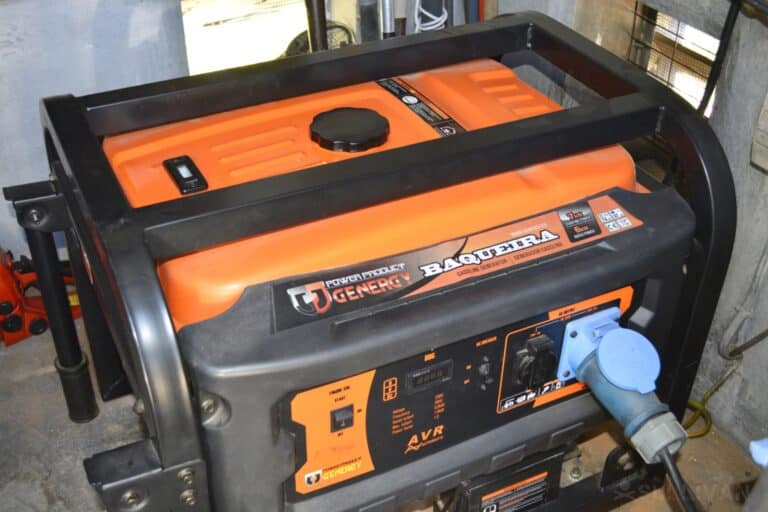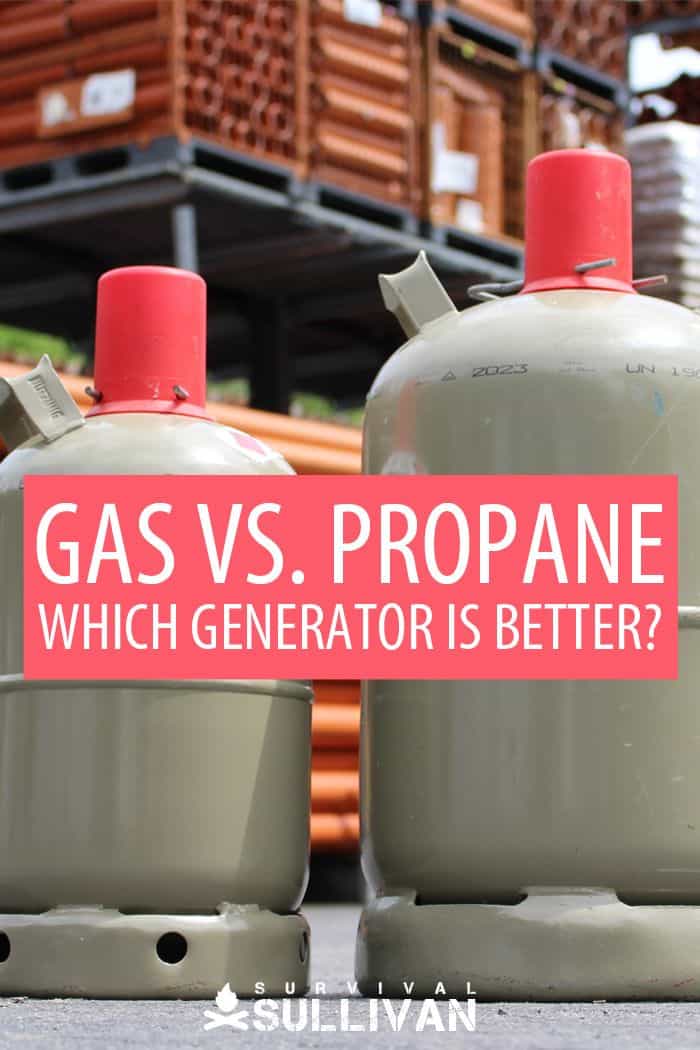One of the most important factors for living off the grid is the need for power. We live in a world where power and especially technology make many tasks much easier.

If you are committed and have the desire to go back to the days of hand tools and candles, it is, of course, possible to live without power. But for most folks, living off the grid or in a bug out location involves being as self-sufficient as possible and not dependent on the power grid to survive.
Even folks who intend to use public electricity, solar powered, or hydro powered electricity at their off-grid location recognize that there will be times when their primary electricity system fails, and they will be without power.
Gas vs. Propane Generators Pros and Cons
| Gas Generator | Propane Generator |
|---|---|
| ❌ less heat for the same amount of fuel (BTU) | ✅ more heat for the same amount of fuel (BTU) – source |
| ❌ 6 months shelf life | ✅ 10+ years shelf life |
| ✅ cheaper | ❌ more expensive |
| ❌ a little louder, but it depends on size, and capacity | ✅ a little quieter, but it depends on size, and capacity |
| ✅ higher power output | ❌ lower power output |
| ❌ flammable – lower ignition temperature – trickier to store | ✅ safer to store, higher ignition temperature |
| ❌more maintenance | ✅ less maintenance |
| ✅ easier to smell to detect leakage | ❌ harder to smell (unless it has additives), so harder to detect leakage |
| ❌ emits more CO2 | ✅ emits less CO2 |
| ✅ easier to store in very cold temperatures | ❌ harder to store in very cold temperatures |
| ✅ natural gas may already be on your property via pipes | ❌ you won’t be able to connect a propane generator to any pipes for instant fuel |
| ❌ harder to have delivered | ✅ easier to have delivered |
| ❌ more likely to spill | ✅ less likely to spill |
| ❌ slower burn | ✅ faster burn |
Power is a valuable resource at your bug out location for things like:
| Power tools | Lights |
| Hot water | Cooking |
| Laundry | Phone |
| Internet | Refrigeration |
| Heat | Entertainment/TV |
| Personal Hygiene |
With everything that we depend on power for, it just makes sense to prepare for a back-up when your primary power system is non-operational either temporarily or indefinitely.
Even solar or hydropower systems can experience outages occasionally. One way to prepare for a power outage is to purchase a generator.
The first decision to make is they type of generator:
- Portable Generator
- Standby Generator
Portable generators are just that, small enough to be moved around to where you need it. They are typically on wheels with handles, so they are easier to move. They are commonly gas powered but can be propane powered or even designed to run on gasoline or propane.
Portable generators cost anywhere from about $800 to $2,000. Portable RV or recreational generators are generally quieter. When you need your generator due to a power outage or to provide power to a remote area, you wheel the generator out of storage, plug in your appliances or a sub panel, and start it up.
Standby generators are typically powered via natural gas, propane, or diesel fuel, and they are designed to kick in automatically when your standard power system is interrupted.
They usually stay in one place once installed, and a 7,000-watt unit will start at around $5,000 installed. These are the small rectangular box systems that you may sometimes see outside a house mounted on a cement foundation.
Types of Fuel That Can Be Used in Generators
- Gasoline
- Propane
- Natural Gas
- Diesel
- Bio Diesel
- Emulsified Diesel
- Hydrogen
Power Output
When it comes to power generators, size really does matter. It’s crucial to do an analysis of your current power usage to determine what size generator will best meet your needs.
If you are only looking for backup power for necessities like refrigeration and lights during a temporary power outage, a smaller generator may be sufficient.
If you are looking to purchase a generator that can run your entire house at its regular power use for any length of time, then you may want to buy a larger generator or a standby generator for your off-grid or bug out location.
To determine the generator that will be the right size for your needs, make a list of all the appliances and other things that you want to run on the generator during a power outage or following a SHTF event. Every appliance should be labeled to indicate when it was manufactured, the model number and the wattage.
Start your list with just the essential items such as refrigeration, freezer, medical machinery, or sump pumps. Keep in mind that most appliances need additional wattage when they are first started.
This probably isn’t reflected in the wattage on their label, so you will need to multiply the wattage by 1.5 to allow for startup wattage requirements.
When you have made your list of essential items and found a minimum wattage for those, decide if there are other items in your home that you would like to run as well and add those into the formula.
Here’s an example of things you may want to run your generator during a temporary power outage:
- Freezer (500 to 750 watts)
- Refrigerator (6.5 amps x 120 volts = 780 to 1200 watts)
- 1/3 horsepower sump pump (800 t0 1200 watts)
- Laptop (135-200 watts)
- 10,000 Btu AC unit (1,500 to 2250 watts)
Total minimum wattage needed for the above items would be about 2500 watts plus the 1500 watts for the AC unit when it was necessary.
So, for the above needs, you would want to buy a generator with enough wattage to run the AC unit and the other items, which total about 4,000 to 6,000 watts to account for the startup surge in wattage.
Keep in mind that the list above doesn’t include a TV, any small appliances, or even lights for your home. A portable generator might be okay if you sacrificed the AC during a power outage or if you had a separate generator to run the AC unit.
But for an extended power outage, you need a larger generator or maybe even a standby generator. A standby generator system which would automatically kick in and power your home during a power outage starts at around $5,000 for a 7,000-watt unit.
Larger standby units up to 30,000-watt units are available if your budget will allow. A standby generator would be connected to the natural gas supply to your home or to a large propane tank which can be installed above or below ground.
Features to Consider When Purchasing a Generator
Power Output (Wattage)
As we discussed earlier, many appliances require additional wattage to start up and then a continuous running wattage after that. When you purchase a generator, you must remember that some of your appliances will require additional wattage to start than to run.
Consider both maximum wattage and the continuous or “running” wattage of your generator to ensure it has enough power to start your appliances as well as run them.
For minimal power needs during a camping trip or an emergency power outage, you can run a refrigerator, some lighting, and your electronics on a generator with a maximum output of 4,000 watts and a continuous output of 3300.
To run an entire home including a refrigerator, freezer, TV, and lighting, you will likely need a starting wattage output of 9,000 or higher and continuous of 7000 watts or more.
Portability and Ease of Use
If you are purchasing a generator for camping, a temporary power outage, or even a SHTF or bug situation, then you must consider portability as well as ease of use.
A large generator, one without wheels or handles, or one that is a pain in the neck to start every time isn’t going to meet your needs.
Regardless of whether it is a gas or propane generator, if it’s bulky or hard to use, you won’t want to bother taking it during a camping or bug out trip.
So, consider weight, ease of startup, as well as the frequency of maintenance. Some generators come with electric start, a remote start, and a pull start option as a backup.
Other features to look for include a fuel gauge and/or a run time meter which indicates remaining run time before refueling will be needed, as well as coverings for unused sockets to prevent dirt and dust build up.
Fuel Efficiency and Run Time
When you first start things up, your generator will need to provide additional power, and then power use will balance out. Generators can come with different sized fuel tanks as well as different motor powers. When considering fuel efficiency and run time for generators, using a half load benchmark allows for comparison between machines.
It is, therefore, possible for a generator with a smaller fuel tank to have a longer half load run time than a machine with a larger tank.
The type of fuel used by the generator will also factor into its efficiency. Dual fuel or Tri-fuel generators provide flexibility to use the fuel that is least expensive or best suited for the situation.
Initial Purchase and Fuel Costs
Portable Gasoline-powered generators are $700 to $2,500 depending on size and other features. Gasoline Powered Standby Generators with 7,000-30,000 watts and above will cost more, starting at around $5,000 and require installation at your home.
Gasoline is currently just over $2.00 per gallon in many areas. Keep in mind that gas prices can fluctuate widely depending on the economic situations in your region.
Careful! If you want to make the switch from propane to gas or vice-versa, you many need conversion kits to be able to run your appliances.
Noise
You want something as quiet as possible. Here’s the two being put to the noise test:
Factors to Consider About Gasoline
- One of the most common and accessible fuels right now
- Will grow scarce during and following a SHTF event
- Can be expensive to purchase
- Requires electricity to fill a gas can
- It is toxic and pollutes air when burned
- It spills or leaks easily and is extremely flammable
- Gasoline has a short shelf life typically only about one year
- Will emit some smoke while running
Portable propane fueled generators are slightly less expensive to purchase initially than portable gasoline generators.
If you choose a whole home or standby generator that runs on propane or natural gas, you can get something like this Briggs & Stratton 10,000 Watt system with auto transfer switch (check the link for price), plus $500-$1,500 for installation depending on cables needed and gas installation.
In climates where temperatures can drop below thirty degrees Fahrenheit, you will also want to buy a cold weather kit to keep your propane generator operable.
Factors to Consider About Propane
- Commonly used for cooking outdoors on the BBQ grill in the warm weather.
- Less likely to spill
- Cleaner burning than gasoline.
- Typically, quieter than gas generators
- it costs about half as much as gasoline.
- No electricity required to fill a propane tank
- Can be stored indefinitely if the reservoir itself holds up which makes it easier to stock up on
- It’s not as efficient as gasoline
- Doesn’t work in colder climates below 20 degrees Fahrenheit
- More complicated system with greater chance of failure and harder to fix when it breaks
- If possible, get a generator that will run on either gasoline or propane for flexibility
Safety Tips and Precautions
- Look for generators that include an automatic shut off as a feature
- Generators that produce low emissions are safest.
- Be sure to consider maximum power and run time (how long will portable generator run on a gallon of gas.
- Outlet warning—don’t plug into a household outlet as you could kill someone outside
- Electrocution hazard—Always disconnect the house system from the grid before starting the generator to avoid electrocuting others working on the line.
- Noise Danger-Generators can be noisy and in a SHTF situation, can attract human intruders.
- Use surge protector
- Use 14-gauge extension cords
- Carbon monoxide—use in a well-ventilated space to avoid poisoning. Run outside away from windows and doors.
- Keep at least 10 feet from your home and avoid awnings, carports, or other coverings that could trap carbon monoxide fumes.
- Do not use in attached garage as fumes can drift into the home
Once you’ve determined the generator wattage that best meets your needs and the type of generator fuel or fuels you want to use, then look at the other features to narrow your choices. If you are purchasing a standby whole home generator, make sure you research and budget for installation requirements and costs.
Verdict
All things considered, gas versus propane, which generator is better? When all is normal in the world, gasoline generators may be less expensive to run in a short-term emergency.
But for those looking to prepare for an extended power outage or a SHTF situation, propane makes more sense. It has an indefinite shelf-life, and you can purchase large tanks that can even be buried underground.
In my opinion, this increased storage capacity makes propane generators the clear winner over gasoline generators when it comes to survival.
Do you currently have a gas or propane powered generator? If so, share your likes or dislikes about it from a prepping standpoint in the comments below.


Born and raised in NE Ohio, with early memories that include grandpa teaching her to bait a hook and watching her mom, aunts, and grandmothers garden, sew, and can food, Megan is a true farm girl at heart.
For Megan, the 2003 blackout, the events of 911, and the increasing frequency of natural disasters like Hurricane Katrina, spurred a desire to be more prepared. Soon to be living off-grid, this mother of four and grandmother of ten is learning everything she can about preparedness, survival, and homesteading.

One additional plus of propane over gas is that propane won’t spill, drastically reducing the risk of fire.
I live in an RV, and have used my generator quite a few times. I have several spare tanks, and keep them all filled.
As an added bonus, I can cook a pizza and bake brownies with the same propane I use to run my gennie. Really hard to do that with gasoline.
I also use a propane generator on my rv and it’s nice to only have to worry about one fuel to run everything
This article makes sense. Thanks a million.
Can anyone define the run time on gasoline compared to propane? In other words if I had an 8000 watt generator that could run with either fuel which one is cheaper to operate by the hour? Not sure that is enough info to answer that question but I am just trying to determine which way I would want to go. I am looking only at emergency situations such as Hurricanes where being without for as much as 1 to 2 weeks is possible. I live in South Georgia so the lower winter temp would not really be an issue.
Propane runs 5-20% longer than gas. It’ll be better to have propane since they don’t go bad. When hurricanes knock out power, many people get gas for their cars and generators and the gas station runs out of gas until the trucks can refill the station and you don’t know when that will happen. Gas prices will also rise during a hurricane.
Propane supply is plentiful and price stays the same.
Any thoughts on solar power?
What happens to propane if less than 20 degrees?